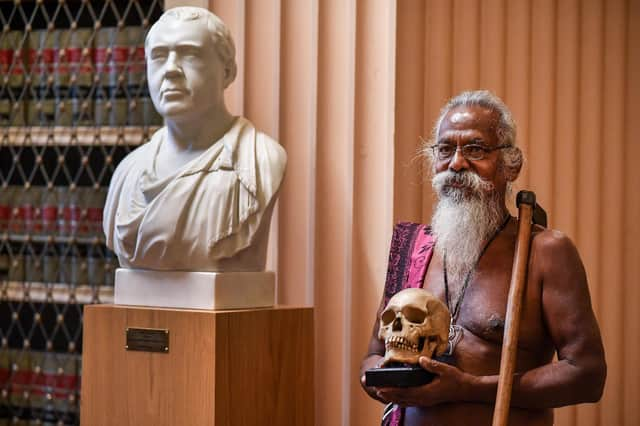Scotland must give a voice to victims of colonialism, slavery and empire – Foysol Choudhury


Many of us enjoy visiting museums as a cultural pursuit, to learn about history and cultures from around the world, and the stories behind the artefacts on display.
However, these stories are sadly often sanitised and don’t recognise or take responsibility for the way in which these artefacts first landed on Scottish soil. Many of Scotland’s collections are embedded in colonial histories, including links with the transatlantic slave trade. Many items were taken without consent from the British empire as mementoes, tokens of war and, in some cases, even human remains were taken to be used in racist practices such as phrenology.
Advertisement
Hide AdAdvertisement
Hide AdThese items are more than inanimate objects, they represent complex and dynamic stories which often involved oppressive violence and exploitation by colonials against indigenous populations to whom the items originally belonged.
We cannot simply see these artefacts as items of intrigue, detached from their histories and the pain which came with them as they were brought to Scotland. Work, which has already begun, on telling the true stories behind these exhibits and their cultural significance must continue and be highlighted in museums. Displaying these objects without providing the true histories behind the British Empire’s role in taking them without consent will only re-enforce the unjust colonial power structures by which British colonials justified stealing them in the first place.
In 2020, after the murder of George Floyd, there was a movement to label statues representing colonialism and slavery across Scotland, including the monument to Henry Dundas on St Andrew Square in Edinburgh. In doing so, statues which appear to be largely celebratory can be put into context and citizens can learn more about the history of slavery and colonial oppression behind many of the UK’s once-revered figures. The same should be done for museum artefacts, to ensure that those visiting can get a sense of the traumatic history that led to their arrival in Scotland.
I am glad to see that National Museums Scotland has already started this work and want to see this commitment reflected in cultural organisations throughout Scotland. The teaching of Scotland’s historical ties with colonialism and slavery must be prioritised in cultural organisations, including museums, to turn the tide against a sanitised narrative and instead uncover the realities which affected thousands across the globe.
Only when this reality is taught and accepted can remedial action truly be taken. Bringing education into our cultural sector will help to uncover how untold histories have shaped culture in Scotland today. I have been championing developing a curriculum for Scottish schools, so that our children can learn about Scotland’s links to slavery and colonialism. However, education cannot stop at school. We must actively pursue education and anti-racism throughout our cultural sector too, to truly generate a shift in the way we see Scotland’s history and the importance of disassembling colonial structures and power imbalances moving forward.
Not only should information about artefacts’ colonial history be conveyed clearly to museum visitors but, where possible, museums should return stolen artefacts. The University of Edinburgh holds a skull collection with a large proportion of them taken without consent, including from parts of the former British Empire. Such a vast collection, within one of Scotland’s highly revered and long-standing institutions, demonstrates just how connected colonial endeavour and racism were with Scotland’s pursuits in education, medicine and culture.
The university is undertaking a process of repatriation and, in 2019, returned nine skulls to the Vedda people of Sri Lanka. I am glad to see this process underway, however, I want to continue to see that the repatriation of items is undertaken in a sensitive manner that recognises Scotland’s fault and does not instead paint Scotland as a compassionate hero, ‘kind’ enough to ‘gift’ the remains back. Language and framing is incredibly important and our programmes of education and repatriation in museums must reflect this.
I welcome the recent report by the independent Steering Group on Empire, Slavery and Scotland's Museums, chaired by Sir Geoff Palmer OBE. The report made six recommendations based on a national consultation. It included a recommendation that Scotland should create a dedicated space to address our role in historic slavery, colonialism and empire. It is important to note that this shouldn’t entail us merely moving stolen artefacts and remains to a dedicated museum. Rather, it should be a place of reflection and responsibility, including representation of multiple lived experiences. The importance of lived experience and the autonomous reflection of culture cannot be understated for ensuring that our historical ties with empire and the cultures affected around the world are represented accurately.
Advertisement
Hide AdAdvertisement
Hide AdIntroducing voices of lived experience allows the museum space – which can often represent colonial endeavours and an abhorrent celebration of exploitation and slavery – to be inhabited by the people that it once subjugated, transformed by more accurate, autonomous voices painting a truer picture of Scotland’s cultural landscape.
The Scottish Parliament passed a motion in 2020 supporting the establishment of a museum of colonialism and slavery. I am committed to ensuring that this suggestion is implemented, so that historic ties between Scotland's cultural landscape, colonialism and empire can be recognised and our cultural endeavours are truly anti-racist. Whilst the decision to establish this museum has been taken, it is important that we now listen to voices affected by colonialism, slavery and empire to ensure that this museum is truly reflective, sensitive and restorative.
Foysol Choudhury is a Labour MSP for Lothian
Comments
Want to join the conversation? Please or to comment on this article.